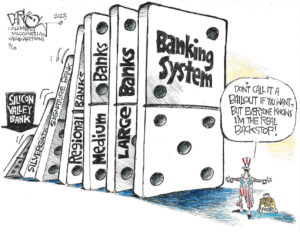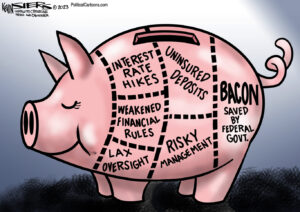New Data Show Extent of Fed’s Free Money Programs
Thanks to Bernie Sanders and the new financial regulation passed by Congress, we’re learning more about the Federal Reserve’s $33 trillion bailout of Wall Street in 2008 It turns out the Fed lent money (more).
Thanks to Bernie Sanders and the new financial regulation passed by Congress, we’re learning more about the Federal Reserve’s $3.3 trillion bailout of Wall Street in 2008. It turns out the Fed lent money not just to the likes of Goldman Sachs (which desperately needed it) but also to companies such as Verizon and Toyota, as well as to foreign financial institutions.
Essentially the Fed lent money at almost zero interest to, well, just about everybody.
Bernie Sanders, take it away… — PZS
Your support matters…The Washington Post:
But the extent of the lending to major banks—and the generous terms of some of those deals—heighten the political peril for a central bank that is already under the gun for a wide range of actions, including a recent decision to try to stimulate the economy by buying $600 billion of U.S. bonds.
“The American people are finally learning the incredible and jaw-dropping details of the Fed’s multitrillion-dollar bailout of Wall Street and corporate America,” said Sen. Bernie Sanders (I-Vt.), a longtime Fed critic whose provision in the Wall Street regulatory overhaul required the new disclosures. “Perhaps most surprising is the huge sum that went to bail out foreign private banks and corporations. As a result of this disclosure, other members of Congress and I will be taking a very extensive look at all aspects of how the Federal Reserve functions.”
Independent journalism is under threat and overshadowed by heavily funded mainstream media.
You can help level the playing field. Become a member.
Your tax-deductible contribution keeps us digging beneath the headlines to give you thought-provoking, investigative reporting and analysis that unearths what's really happening- without compromise.
Give today to support our courageous, independent journalists.




You need to be a supporter to comment.
There are currently no responses to this article.
Be the first to respond.